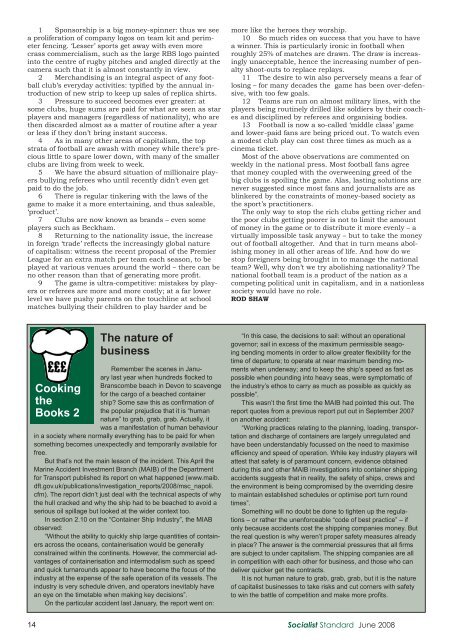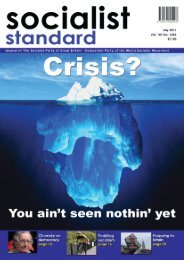Socialist Standard June 2008 - World Socialist Movement
Socialist Standard June 2008 - World Socialist Movement
Socialist Standard June 2008 - World Socialist Movement
You also want an ePaper? Increase the reach of your titles
YUMPU automatically turns print PDFs into web optimized ePapers that Google loves.
1 Sponsorship is a big money-spinner: thus we see<br />
a proliferation of company logos on team kit and perimeter<br />
fencing. ‘Lesser’ sports get away with even more<br />
crass commercialism, such as the large RBS logo painted<br />
into the centre of rugby pitches and angled directly at the<br />
camera such that it is almost constantly in view.<br />
2 Merchandising is an integral aspect of any football<br />
club’s everyday activities: typified by the annual introduction<br />
of new strip to keep up sales of replica shirts.<br />
3 Pressure to succeed becomes ever greater: at<br />
some clubs, huge sums are paid for what are seen as star<br />
players and managers (regardless of nationality), who are<br />
then discarded almost as a matter of routine after a year<br />
or less if they don’t bring instant success.<br />
4 As in many other areas of capitalism, the top<br />
strata of football are awash with money while there’s precious<br />
little to spare lower down, with many of the smaller<br />
clubs are living from week to week.<br />
5 We have the absurd situation of millionaire players<br />
bullying referees who until recently didn’t even get<br />
paid to do the job.<br />
6 There is regular tinkering with the laws of the<br />
game to make it a more entertaining, and thus saleable,<br />
‘product’.<br />
7 Clubs are now known as brands – even some<br />
players such as Beckham.<br />
8 Returning to the nationality issue, the increase<br />
in foreign ‘trade’ reflects the increasingly global nature<br />
of capitalism: witness the recent proposal of the Premier<br />
League for an extra match per team each season, to be<br />
played at various venues around the world – there can be<br />
no other reason than that of generating more profit.<br />
9 The game is ultra-competitive: mistakes by players<br />
or referees are more and more costly; at a far lower<br />
level we have pushy parents on the touchline at school<br />
matches bullying their children to play harder and be<br />
more like the heroes they worship.<br />
10 So much rides on success that you have to have<br />
a winner. This is particularly ironic in football when<br />
roughly 25% of matches are drawn. The draw is increasingly<br />
unacceptable, hence the increasing number of penalty<br />
shoot-outs to replace replays.<br />
11 The desire to win also perversely means a fear of<br />
losing – for many decades the game has been over-defensive,<br />
with too few goals.<br />
12 Teams are run on almost military lines, with the<br />
players being routinely drilled like soldiers by their coaches<br />
and disciplined by referees and organising bodies.<br />
13 Football is now a so-called ‘middle class’ game<br />
and lower-paid fans are being priced out. To watch even<br />
a modest club play can cost three times as much as a<br />
cinema ticket.<br />
Most of the above observations are commented on<br />
weekly in the national press. Most football fans agree<br />
that money coupled with the overweening greed of the<br />
big clubs is spoiling the game. Alas, lasting solutions are<br />
never suggested since most fans and journalists are as<br />
blinkered by the constraints of money-based society as<br />
the sport’s practitioners.<br />
The only way to stop the rich clubs getting richer and<br />
the poor clubs getting poorer is not to limit the amount<br />
of money in the game or to distribute it more evenly – a<br />
virtually impossible task anyway – but to take the money<br />
out of football altogether. And that in turn means abolishing<br />
money in all other areas of life. And how do we<br />
stop foreigners being brought in to manage the national<br />
team Well, why don’t we try abolishing nationality The<br />
national football team is a product of the nation as a<br />
competing political unit in capitalism, and in a nationless<br />
society would have no role.<br />
ROD SHAW<br />
Cooking<br />
the<br />
Books 2<br />
The nature of<br />
business<br />
Remember the scenes in January<br />
last year when hundreds flocked to<br />
Branscombe beach in Devon to scavenge<br />
for the cargo of a beached container<br />
ship Some saw this as confirmation of<br />
the popular prejudice that it is “human<br />
nature” to grab, grab, grab. Actually, it<br />
was a manifestation of human behaviour<br />
in a society where normally everything has to be paid for when<br />
something becomes unexpectedly and temporarily available for<br />
free.<br />
But that’s not the main lesson of the incident. This April the<br />
Marine Accident Investment Branch (MAIB) of the Department<br />
for Transport published its report on what happened (www.maib.<br />
dft.gov.uk/publications/investigation_reports/<strong>2008</strong>/msc_napoli.<br />
cfm). The report didn’t just deal with the technical aspects of why<br />
the hull cracked and why the ship had to be beached to avoid a<br />
serious oil spillage but looked at the wider context too.<br />
In section 2.10 on the “Container Ship Industry”, the MIAB<br />
observed:<br />
“Without the ability to quickly ship large quantities of containers<br />
across the oceans, containerisation would be generally<br />
constrained within the continents. However, the commercial advantages<br />
of containerisation and intermodalism such as speed<br />
and quick turnarounds appear to have become the focus of the<br />
industry at the expense of the safe operation of its vessels. The<br />
industry is very schedule driven, and operators inevitably have<br />
an eye on the timetable when making key decisions”.<br />
On the particular accident last January, the report went on:<br />
“In this case, the decisions to sail: without an operational<br />
governor; sail in excess of the maximum permissible seagoing<br />
bending moments in order to allow greater flexibility for the<br />
time of departure; to operate at near maximum bending moments<br />
when underway; and to keep the ship’s speed as fast as<br />
possible when pounding into heavy seas, were symptomatic of<br />
the industry’s ethos to carry as much as possible as quickly as<br />
possible”.<br />
This wasn’t the first time the MAIB had pointed this out. The<br />
report quotes from a previous report put out in September 2007<br />
on another accident:<br />
“Working practices relating to the planning, loading, transportation<br />
and discharge of containers are largely unregulated and<br />
have been understandably focussed on the need to maximise<br />
efficiency and speed of operation. While key industry players will<br />
attest that safety is of paramount concern, evidence obtained<br />
during this and other MAIB investigations into container shipping<br />
accidents suggests that in reality, the safety of ships, crews and<br />
the environment is being compromised by the overriding desire<br />
to maintain established schedules or optimise port turn round<br />
times”.<br />
Something will no doubt be done to tighten up the regulations<br />
– or rather the unenforceable “code of best practice” – if<br />
only because accidents cost the shipping companies money. But<br />
the real question is why weren’t proper safety measures already<br />
in place The answer is the commercial pressures that all firms<br />
are subject to under capitalism. The shipping companies are all<br />
in competition with each other for business, and those who can<br />
deliver quicker get the contracts.<br />
It is not human nature to grab, grab, grab, but it is the nature<br />
of capitalist businesses to take risks and cut corners with safety<br />
to win the battle of competition and make more profits.<br />
14 <strong>Socialist</strong> <strong>Standard</strong> <strong>June</strong> <strong>2008</strong><br />
<strong>June</strong> 08.indd 14 20/5/08 10:39:43






